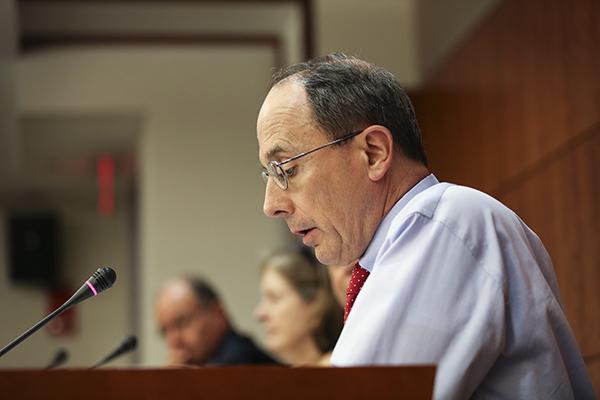Faculty, administrators and trustees took a large step toward resolving a long-debated issue of which faculty can play a part in making major University decisions last week.
Half of the faculty representatives in the senate from a single school would have to have tenure or be on tenure-track, and have been at GW for more than three years, according to a resolution passed on Friday. Most faculty agreed that the resolution fits the needs of the University, and all faculty can vote on the resolution at next month’s Faculty Assembly meeting.
Previously, Faculty Senate membership was limited to tenured faculty in most schools, but this resolution allows for more research and teaching faculty to participate in helping to govern the University — a topic that has been discussed as part of a two-year investigation of Faculty Senate procedures, Arthur Wilmarth, a member of the Faculty Senate executive committee, said.
Tenure gives faculty top job security at universities, making it easier for faculty to speak their minds. Because at least half of the senate members will have tenure, the senate will be able to act without feeling pressured by administrators, Wilmarth said. He added tenured faculty on the senate could help create a long-term vision for GW, something part-time or non-tenured professors may not be able to offer.
“My belief is that faculty with tenure have very long-term goals, and have the need to engage in robust dialogue to disagree with the University on an issue,” Wilmarth, who is a law professor, said at the meeting.
This was the second time in recent months that the Faculty Senate voted on participation of non-tenured faculty in the senate. They passed a similar resolution in May, but the Board of Trustees passed their own version of the resolution in June, ensuring that at least half of the members from a single school were tenured so senate members could engage with administrators without putting their professor jobs at risk.
Most representatives in the Faculty Senate voted to pass the resolution in fear that if more non-tenured faculty serve on the senate, they would be more influenced by administrators. Most research faculty are funded through grants or paid through other forms of soft money.
Madeleine Jacobs, a Board of Trustees member and chair of the academic affairs committee who has overseen working groups to evaluate the faculty code, said she sensed that faculty overall supported the inclusion of specialized faculty on the Faculty Senate, as they contribute to the “life of the University.”
“The working groups felt that the faculty had the right to elect anyone to the Faculty Senate, and if they didn’t want specialized faculty from that school, they wouldn’t elect them,” Jacobs said.
But Faculty Senate members also worried the resolution was too limiting, especially those from schools that rely on non-tenured faculty.
Karen McDonnell, a professor of public health, asked that the resolution be “withdrawn” because the 50 percent rule would not benefit the Milken Institute School of Public Health, which employs a large number of research and otherwise part-time faculty.
The resolution, which applies to every school outside of the School of Medicine and Health Sciences and the School of Nursing, allows schools to choose how to organize their assigned number of seats in the Senate and vote on those seats.
“Schools have broad versions of how to hold elections. It could be that if you have two positions one has to be tenured and the other untenured or something completely different,” Wilmarth said.







